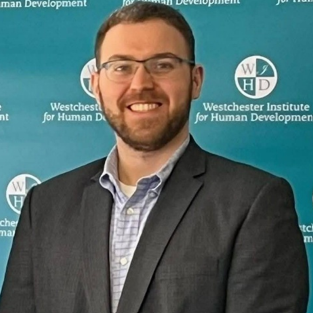Brendan’s Journey at the Westchester Institute for Human Development
Sometimes discovering your own potential just takes a little bit of support. That is the purpose of Supported Employment (SEMP) programs that promote workplace independence through job coaching. LIFEPlan member Brendan Klein began SEMP to develop the skills he needed to prepare for the workforce. Brendan now works at the Westchester Institute for Human Development (WIHD) as a Coordinator of Self Advocacy and Community Engagement. In his role, he shares his insights as a self-advocate to help people with disabilities feel empowered and connected to their communities. Brendan works with OPWDD and many different organizations to help shape more inclusive systems.
Brendan began working with his job coach, Minh Nguyen, when he first got the job with WIHD. Initially, Minh worked with Brendan on improving his email skills, time management, and presentation skills. Now, as Brendan has become more comfortable in his role, Minh supports Brendan as what the two of them call a “shadow,” offering support when needed. She often acts as Brendan’s notetaker and assists him in learning any new programs or software he may need for his work. Because he is so passionate about advocating for people with disabilities, Brendan is often coming up with new ideas. Minh says her job is to help Brendan better communicate his point of view and bring his ideas to life. Brendan’s manager and Manager for Self-Advocacy and Community Engagement at WIHD, Mariela Adams, says that it is important for individuals to be engaged in meaningful work, and the support job coaches provide is invaluable and shows through productivity.
Brendan says he was eager to work at WIHD because he is passionate about advocacy and disability rights. He references rights that relate to supported employment. For example, a job coach can be a reasonable accommodation, which is protected under the Americans with Disabilities Act (ADA). Brendan explains that he not only feels that the work he does is important, but he is breaking down barriers by being employed himself. He says the goal is “to change the mindset on how people with disabilities work” to get companies to see the benefit in hiring people with disabilities for a variety of positions and understand what they can do to make employment more accessible.
The Westchester Institute for Human Development offers programs that support people with disabilities in their social lives, advocacy, and employment. Brendan says it can be helpful to look at these things as steps to independence, one building on the next. Social skills can improve communication, which can then lead to more effective advocacy, and learning to speak up and make your voice heard can then help in the workplace, as it better equips you for telling others what you need to be successful. Brendan says programs like this are important because they help people with disabilities develop the tools they need to speak up. Specifically, their “Hear Our Voices” meetings provide opportunities for self-advocates to learn from other self-advocates. Meeting topics may include things like how to set boundaries and how to communicate needs. Learning from peers is beneficial because they can offer their own experiences. Brendan says it is through open discussions like the ones in the “Hear Our Voices” meetings that relationships are built and advocacy is cultivated.
Learn more about the Westchester Institute for Human Development at http://www.wihd.org
Join the Hear Our Voices Advocacy Group and other self-advocacy programs at http://www.wihd.org/self-advocacy

